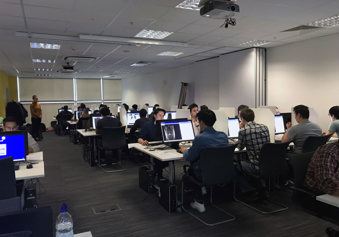Final FRCR Exam (Oncology) - CO2A - purpose of assessment statement
The Fellowship of The Royal College of Radiologists (FRCR) exams have been designed to assess the knowledge and skills of clinical oncology trainees as they progress through a number of levels of competence and to demonstrate their readiness to move to the next stage of training.
The Final FRCR Exam is in two parts: Part A and Part B. It focuses on how to manage patients with cancer and assesses the knowledge, skills and some of the behaviours required to complete intermediate clinical oncology training. It comprises two components: a single best answer exam (Part A) and a multi-station assessment (Part B). As the knowledge, skills and behaviours assessed in this exam are essential as a basis for developing advanced tumour site-specialist expertise, this exam must be completed before the trainee progresses to advanced clinical oncology training. Further information can be found in the core curriculum.
Final FRCR Exam Part A
This exam consists of two single best answer (SBA) papers, which assess knowledge of a wide range of common and important disorders in oncology, as set out in the syllabus, and the ability to apply clinical understanding and make clinical judgements.
- Paper 1 focuses on the following tumour types: respiratory, urology, head and neck, skin, central nervous system and gynaecology.
- Paper 2 focuses on the following tumour types: breast, lower gastrointestinal, upper gastrointestinal, haematology, miscellaneous and image-based.
The exam takes the format of a synoptic assessment, as this ensures trainees can demonstrate coherence, integration and application of learning across the subject area concerned. The exam is blueprinted against the curriculum and the relative incidence of the diseases encountered in clinical practice.
The exam assesses the candidates:
- Core medical knowledge
- Basic clinical problem-solving skills
- Management of common and important oncological emergencies
- Ability to process information to formulate a differential diagnosis
- Requisition and interpretation of appropriate investigations
- Application of medical knowledge in order to produce a management plan
The exam assesses the candidate’s competence in relation to:
- Advanced problem-solving skills
- Prioritisation of diagnostic or problem lists
- Planning investigations
- Selecting a plan for immediate management
- Selecting a plan for long-term management
- Investigation, diagnosis, management and prognosis of a range of acute and chronic oncological conditions
- Recognition and management of complications of a primary diagnosis
- Recognition and management of complications of therapies
- Evidence-based medicine and nationally/specialty-based approved management guidelines
The SBA question format is used because, in addition to testing core knowledge and comprehension, it allows the candidate to demonstrate their application of knowledge or their synthesis and evaluation of information. The candidate must solve problems by applying acquired knowledge, facts, techniques and rules in a clinically relevant situation. The candidate must make judgements about information, the most likely pathology or quality of work based on a set of criteria.
Final FRCR Exam Part B
The Final FRCR Part B is not designed as an exit exam but instead marks an important step in the progression of a clinical oncology trainee towards the ability to use their knowledge and skills as an independent practitioner.
At the same time, the exam provides the public with an assurance that oncologists in training are being assessed to a consistently high standard and that the holders of the Fellowship have achieved a nationally recognised high quality of clinical performance.
The award of the Final FRCR (Part B) is designed as part of a programme of assessment which indicates that the candidate has achieved capabilities and met expected levels of performance as set out in the curriculum and has the basis of knowledge and skills on which to develop advanced tumour site-specific expertise.
The exam assesses a candidate’s oncological skills, all of which are considered necessary for safe and effective clinical practice. These skills include:
- Managing patients with cancer
- Safe and effective delivery of treatment therapies
- Management of patients receiving treatment in any setting
- Interpretation of imaging
- Formulating patient-centred management plans across a variety of common presentations
- In-depth issues surrounding radiotherapy planning
- Communication skills
- Clinical decision making
The exam has been formatted to assess a candidate’s ability against an expected level in specific key skills which form a large part of the clinical oncology workload. The exam will provide summative evidence of the candidate’s performance. Elements of the exam simulate day-to-day clinical discussions and multidisciplinary team (MDT) meetings, which form an integral part of an oncologist’s workload, as well as assessing key skills of a clinical oncologist, such as contouring and patient communication.
Our exams
Find out more about our FRCR exams in clinical radiology and clinical oncology, and DDMFR exams in dental and maxillofacial radiology.
